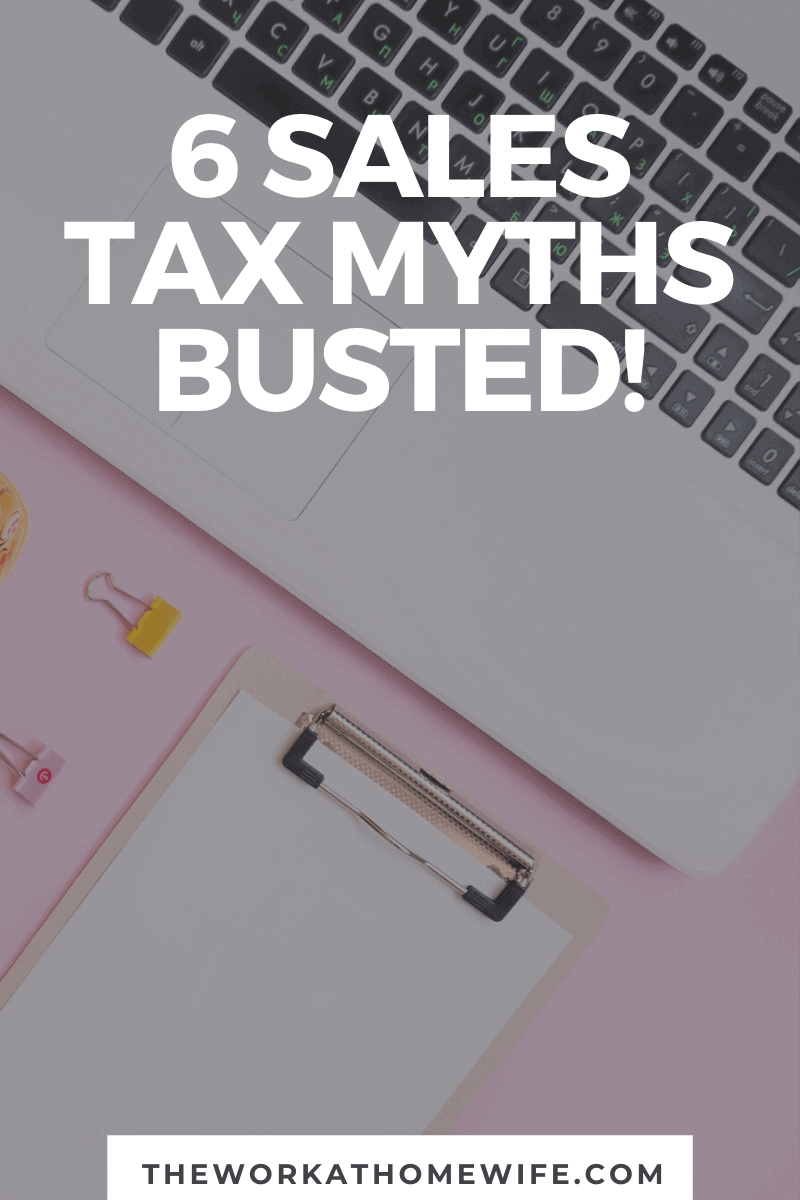 There is no owner’s manual when you start your own business. This is especially true when dealing with US sales tax. Each state has different sales tax laws, rules and regulations. On top of that, the sales tax liability of each individual business varies. Because sales tax is so mysterious, many rumors and myths swirl around this ubiquitous business task. Today, we’ll cover the most common sales tax myths!
There is no owner’s manual when you start your own business. This is especially true when dealing with US sales tax. Each state has different sales tax laws, rules and regulations. On top of that, the sales tax liability of each individual business varies. Because sales tax is so mysterious, many rumors and myths swirl around this ubiquitous business task. Today, we’ll cover the most common sales tax myths!
Myth #1: I pay sales tax to the IRS
Many new business owners are confused about the difference between income tax and sales tax. You pay income tax on your business income. The IRS is responsible for administering federal income taxes. (And if your state has an income tax, your state’s taxing authority is responsible for administering the state’s income tax.)
But sales tax is only a state-level tax. Forty-five states and Washington DC have sales taxes. Sales tax is administered by each state’s taxing authority (commonly called “[state] Department of Revenue”).
Another difference between income tax and sales tax is that retailers collect sales tax from customers and pass the sales tax to the state. Sales tax is a pass-through tax and you, the retailer, never pay sales tax out of pocket.
Myth #2: I don’t have to collect sales tax if I only sell on the Internet
Many online sellers, especially new sellers who only sell from home, are under the misconception that they don’t have to collect sales tax because they own a small, home-based business. Unfortunately, this is a myth. If you sell taxable goods in your business, you must register for a sales tax permit with your state and collect sales tax.
Myth #3: Every business must collect sales tax from customers
Sales tax is a tax on the sale of taxable goods. In most states, tangible items (jewelry, coffee mugs, furniture, etc.) are taxable while services (landscaping, piano lessons, accounting, etc.) are not.
To complicate matters further, some states now consider certain services taxable If you’re not sure whether to collect sales tax on the goods or services you sell, check with your state’s department of revenue.
Myth #4: I don’t have to collect sales tax when I sell a product if I pay sales tax when I buy that product
Many online sellers start doing their “retail arbitrage”. Long story short, it means buying products at a low price and reselling them at a high price. Since you are buying these products from retailers who are required to charge sales tax, you will likely pay sales tax at the time of purchase.
But the thing to remember is that sales tax is charged on the transaction, not the item. So even if you pay sales tax when you buy an item, you still owe sales tax to the buyer when you resell it. (As long as you sell it to a customer in a state where you have Sales tax relationshipBut that’s a topic for a whole other post.)
Fortunately, there is a way to avoid paying sales tax on items and products and then turning around and charging sales tax to your customers. You can use a “Resale Certificate” when making a purchase. When you use a valid resale certificate at a retailer who will accept it, you don’t have to pay sales tax on the items you want to resell. you will find More information about resale certificates here.
Myth #5: I must always collect sales tax only in my home state
As a product seller, you only need to collect sales tax in states where you have sales tax relationships. Many new businesses only have sales tax nexus in their home state. But businesses create sales tax relationships in several ways, including:
- Being an employee or contractor in a state
- Being a location or inventory in a state
- Having an affiliate in a state
- Having a drop shipping relationship with a seller in one state
- Provisional sale in a state
As your business grows and changes, you may establish sales tax relationships in a new state. When you establish nexus in a new state, you must register for a sales tax permit and collect sales tax from buyers in that state.
Myth #6: If I don’t collect any sales tax, I don’t have to file a sales tax return
When you register for a sales tax permit, your state will tell you the frequency of filing and sales tax due dates. You typically need to file a sales tax return monthly, quarterly, or annually. This is true even if you don’t make a single sale or collect a dime of sales tax during the taxable period.
If you owe a sales tax return, file that return even if you tell the state “I collected $0.00.” Failure to file one of these “zero returns” can result in everything from monetary penalties to revocation of your sales tax permit. Don’t forget to file your return by the due date!
I hope this post dispels some common sales tax myths. To learn more about sales tax, visit us Sales Tax 101 for Online Sellers Guide.
TaxJar is a service that simplifies sales tax reporting and filing for over 8,000 online sellers. Try TaxJar’s 30-day free trial Take sales tax compliance headaches out of your life today!

No Comments
Leave a comment Cancel